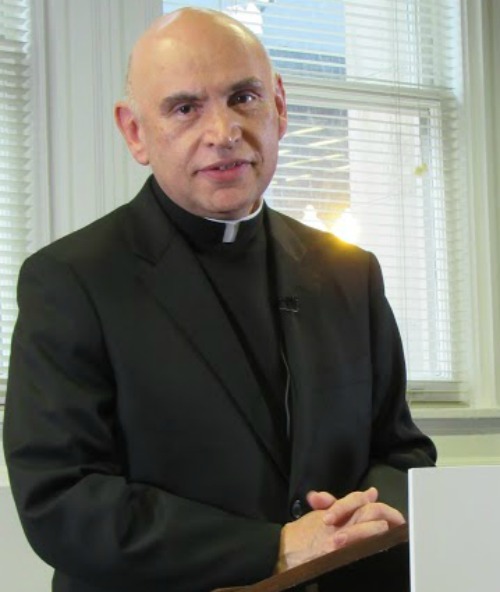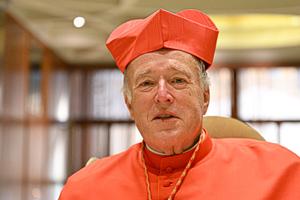Pope Francis Gives D.C. Archdiocese Another Shepherd for Latino Catholic Souls
A Register interview with Father Mario Dorsonville, vice president for Catholic Charities D.C., who was appointed March 20 as an auxiliary bishop in the nation’s capital.

WASHINGTON — Service to the poor, the marginalized and the immigrants who suffer from a culture of indifference are qualities Pope Francis has wanted in the Church’s shepherds. The Pope has given the Archdiocese of Washington a new Spanish-speaking auxiliary bishop who has that experience in spades.
Colombian-born Father Mario Dorsonville, Catholic Charities D.C.’s vice president for missions and director of the archdiocese’s Spanish Catholic Center, was appointed March 20 by the Holy Father to be consecrated a bishop to help Cardinal Donald Wuerl carry out his ministry to the archdiocese’s Latino Catholic population,
Fluent in both English and Spanish, Father Dorsonville has more than 20 years of pastoral ministry in bilingual parish settings within the northern Virginia/Washington metropolitan area. He will be the archdiocese’s only active Spanish-speaking auxiliary bishop when Pope Francis arrives in the nation’s capital this September.
Father Dorsonville spoke with the Register about the evangelization challenges in the Latino community, catechizing the faithful about the Church’s immigration teaching and drawing strength from embracing the cross.
What is your primary task going to be as an auxiliary bishop for the archdiocese?
The cardinal has indicated that, because I’m perfectly bilingual, he would like me to have an accent on the Hispanic community and the immigrant community in our different parishes in the Archdiocese of Washington.
What are some of the challenges you will be taking up?
Most of the time, the challenge is the lack of vocations and priests who are bilingual to minister to them [the Latino community]. So I guess that we are short most of the time for bilingual priests. That’s one.
The other would be trying to assimilate cultures in one parish setting. That is possible, to make it happen, but we are not there yet. It’s a process of understanding cultures and trying to reach each other from different perspectives of seeing life and seeing the way that we develop our faith and our relationship with Jesus Christ.
The Church has a very large and growing Hispanic community, but why have the numbers of Spanish-speaking priests and seminarians not kept pace?
I think among the most important points is the lack of education and opportunities to go to school and get prepared. There are so many good men who came to the United States, but just to work. They work and work and work and never even learn the language they need to go to high school and college. That creates a real barrier for them to apply to seminary. They need to have a certain level of studies and a certain way to handle foreign languages. I think that would be one of the main challenges that we might be facing.
Another one would be the lack of immigration reform, since some of them are undocumented. Therefore, that creates another problem for those open to be received into seminaries.
The third one is the culture we are living in. It’s very promiscuous, and I think we really need to dig into evangelization, into the lives of the youngsters, to create the moral values for them to continue to answer this relationship with Jesus Christ.
How can the parishes do more to advance this need for evangelization?
By creating spots and occasions for youngsters to come: to enjoy themselves, to be able to communicate themselves, to be able to share their dreams and to get to know what it truly means to have a truthful friendship. I think if they get to know Jesus as their best friend, then they are on the road. And parishes really need to evangelize them, through ways where they feel happier, more comfortable in coming to worship and to grow deeper in their understanding of the Person of Jesus Christ.
In your experience as a pastor serving in the archdiocese, did you encounter parishes that you thought did that well?
There are many of our parishes that are doing a magnificent job, and they can reflect that because of the assistance [of youth] at Sunday Mass. For the events we have throughout the archdiocese, there is such a great sense of faithfulness in youngsters and people who are eager. One thing that shows our archdiocese is doing well is that we have 79 seminarians studying to become priests.
Big question: immigration. A lot of Catholics disagree with the U.S. bishops’ teaching here, and some think the bishops are engaging in politics. How do you hope to bridge that divide?
I think we have to take it through the teaching of the Gospel: It’s a humanitarian act. That’s what Pope Francis is saying. Pope Francis is saying that we just can’t close the doors to anyone. He has exhorted us to be able to understand the drama, the pain of those who are not immigrating because they want to, but sometimes because they are forced to. Therefore, the Christian principle is to understand them, to be with them, to embrace them.
How do you not get discouraged when you see others, such as Catholics in the pews, indifferent to the situation of others, whether it is the immigrants, the homeless, the poor, etc.?
I think there is just one answer: faith. I fix my eyes and see Jesus, who was disappointed because people who followed him didn’t believe in him, and, finally, they ended up crucifying him. So I think if the Son of God went through tough roads, why aren’t we going to embrace our crosses? Sometimes it is just faith: putting faith in what you do, knowing that you are just an instrument; God is the one who is using you.
Is there a difference between advocacy and engaging in politics?
Absolutely. A bishop, a priest and so many people can become the voice of the voiceless. If the voice of the prophetic becomes quiet, where are you going to find God’s wisdom? I really think that’s our role, our mission and our vocation.
As a new bishop, you’ll have more responsibility. How do you find the strength to accept the increased demands that will come with your new duties?
There is one strength, and that is recognizing in the faces of people the presence of Jesus. When … his or her face of gratitude comes to your eyes — I really think that is the most beautiful experience that you can ever receive, because you know that person isn’t going to pay you. God will pay you, and God will bless you.
Any thoughts as you approach for ordination as bishop?
Pray for me, as Pope Francis says all the time. I understand him now, because you embrace it, and you’re eager to do it, but you know that you need the love, the prayers and the support of the faithful.
Peter Jesserer Smith is the Register's Washington correspondent.

















